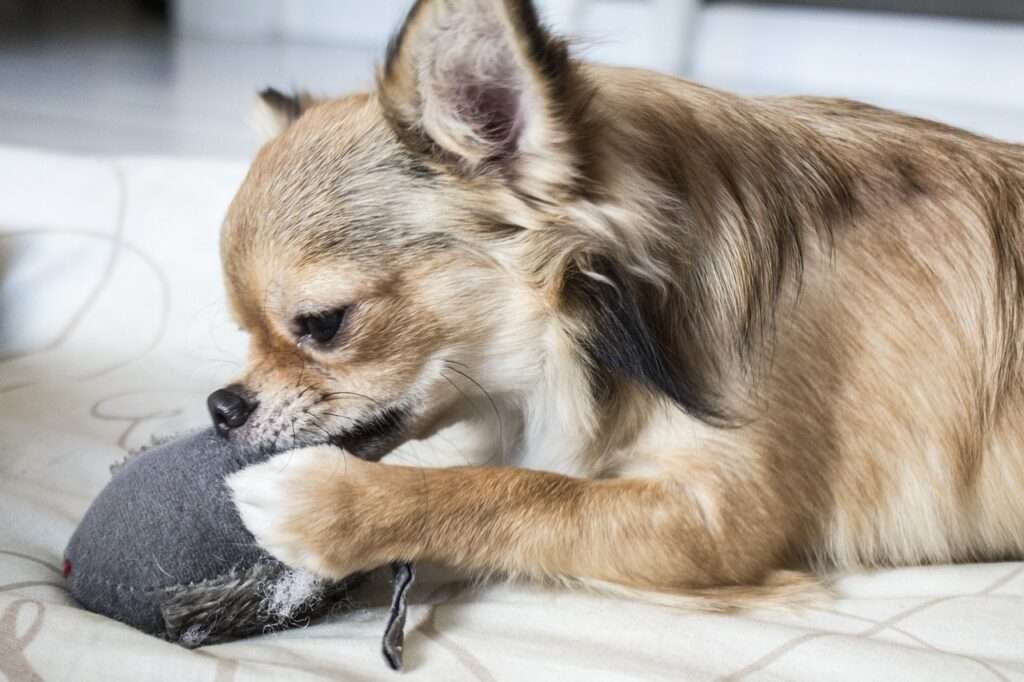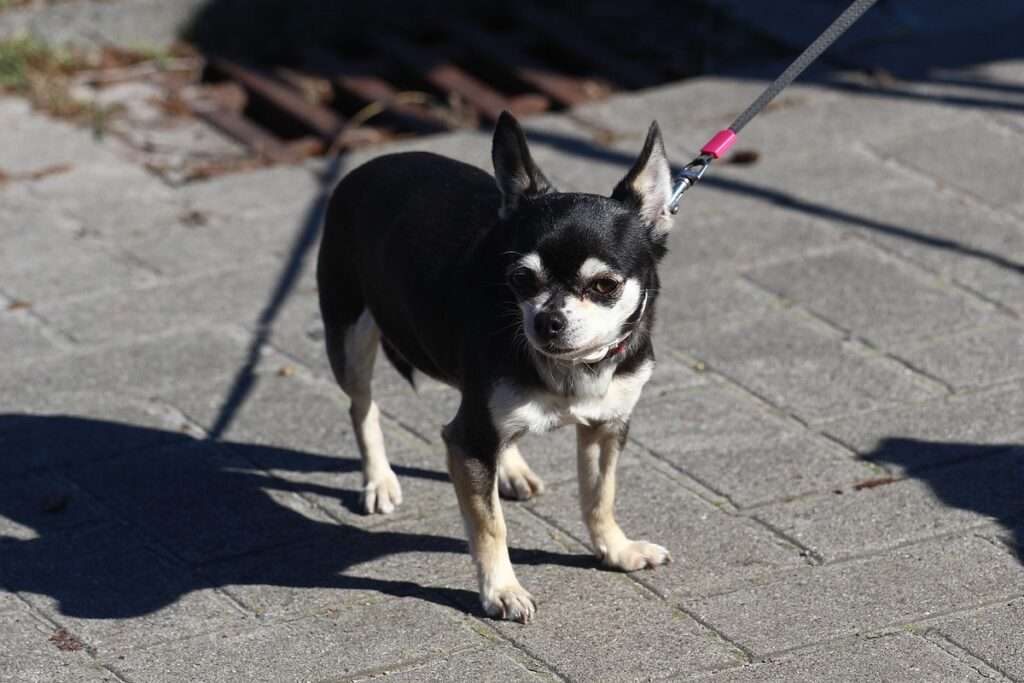Why Are Chihuahuas So Aggressive? Unlocking the Mysteries with Actionable Advice!
Chihuahuas, with their tiny frames and big personalities, have captured the hearts of dog lovers worldwide. However, alongside their endearing traits, there’s a common perception of Chihuahuas as aggressive little dogs. “Why are Chihuahuas so aggressive?” is a question that often arises among dog owners and enthusiasts. With their pint-sized stature and feisty demeanor, it’s natural to wonder about the factors influencing Chihuahua behavior.
In this guide, we delve deep into the complexities of Chihuahua aggression, exploring the various factors that contribute to their behavior and providing practical insights for owners. Whether you’re a seasoned Chihuahua owner or considering adding one to your family, understanding the truth behind Chihuahua aggression is essential for fostering a harmonious relationship with these beloved companions.
Exploring Chihuahua Temperament and Behavior
Before delving into the topic of Chihuahua aggression, it’s essential to understand the breed’s temperament and behavior traits. Chihuahuas are known for their boldness, loyalty, and strong-willed nature. Despite their small size, they often exhibit confidence and assertiveness, traits that can sometimes be misconstrued as aggression.
Chihuahuas are also fiercely loyal to their owners and may exhibit protective behavior, especially in unfamiliar or threatening situations. However, it’s essential to recognize that aggression in Chihuahuas is not a breed-specific trait but rather a result of various factors, including genetics, socialization, and environment.
These tiny dogs have a lot of personality packed into their small bodies. They are known for their intelligence and can be quite cunning when it comes to getting their way. Chihuahuas are also known to be sensitive to their environment, which can sometimes manifest as nervousness or even fear aggression in certain situations.
Despite their occasional feistiness, Chihuahuas can be affectionate and loving companions when properly trained and socialized. Understanding their unique temperament and behavior is crucial for providing them with the care and guidance they need to thrive.
Factors Influencing Chihuahua Aggression
Chihuahua aggression is a multifaceted issue influenced by various factors. While breed genetics play a role, they are not the sole determinant of a Chihuahua’s behavior. Contrary to popular belief, not all Chihuahuas are aggressive, and aggression should not be considered a breed-specific trait.
Factors such as socialization, training, and environment play significant roles in shaping a Chihuahua’s temperament and behavior. Early socialization with people, animals, and various environments is crucial for preventing fear-based aggression and promoting positive interactions.
Additionally, the way a Chihuahua is raised and treated by its owner greatly influences its behavior. Harsh training methods or neglectful treatment can exacerbate aggressive tendencies, while positive reinforcement and consistent training can help foster a well-adjusted and balanced Chihuahua.
Chihuahua aggression is further complicated by the phenomenon known as “small dog syndrome.” Although not a medically recognized condition, small dog syndrome describes certain behavioral tendencies observed in small breeds like Chihuahuas. These behaviors, including excessive barking, territorial aggression, and defiance, may result from a combination of the dog’s size and the way they are treated by their owners.
Types of Aggression in Chihuahuas

Aggression in Chihuahuas can manifest in different forms, each with its underlying causes. Understanding these types of aggression is crucial for effectively addressing and managing your Chihuahua’s behavior:
- Fear Aggression: Chihuahuas may exhibit aggression when they feel threatened or fearful. This type of aggression is often a result of past traumatic experiences or inadequate socialization.
- Resource Guarding: Some Chihuahuas may become aggressive when they feel their possessions, such as food or toys, are being threatened or taken away. Resource guarding can stem from insecurity or a lack of trust.
- Territorial Aggression: Chihuahuas are known for their strong territorial instincts and may become aggressive towards perceived intruders or threats to their territory. Proper training and socialization can help mitigate territorial aggression.
- Redirected Aggression: In certain situations, such as during a confrontation with another dog or person, a Chihuahua may redirect their aggression onto a nearby target, including their owner or another pet.
- Predatory Aggression: Chihuahuas, like all dogs, have natural hunting instincts that may manifest as predatory aggression, especially towards smaller animals or objects that trigger their prey drive.
By understanding the root causes of aggression in Chihuahuas, owners can take proactive steps to address and manage their dog’s behavior effectively.
Signs of Aggression in Chihuahuas
Identifying signs of aggression in Chihuahuas is essential for addressing behavioral issues before they escalate. While Chihuahuas are small in size, they can exhibit a range of behaviors indicating aggression:
- Growling, Snarling, and Baring Teeth: Vocalizations such as growling or snarling, accompanied by baring teeth, are common signs of aggression in Chihuahuas. These behaviors typically occur when a Chihuahua feels threatened or stressed.
- Lunging and Biting: Aggressive Chihuahuas may lunge towards perceived threats or engage in biting behavior as a defensive or offensive response. It’s essential to address these behaviors promptly to prevent injuries to people or other pets.
- Body Language Cues: Pay attention to your Chihuahua’s body language, as it can provide valuable insights into their state of mind. Raised hackles, stiff posture, and a tense facial expression are indicators of heightened aggression.
- Resource Guarding: Chihuahuas may exhibit aggression when guarding their food, toys, or other possessions. Signs of resource guarding include stiffening, growling, and snapping when approached while in possession of an item.
Recognizing these warning signals can help owners intervene and address aggression in Chihuahuas effectively.
Managing and Preventing Chihuahua Aggression
Addressing Chihuahua aggression requires a proactive approach that focuses on positive reinforcement, socialization, and creating a safe environment. Here are some strategies for managing and preventing aggression in Chihuahuas:
- Positive Reinforcement Training: Use positive reinforcement techniques, such as treats and praise, to reward desirable behaviors and discourage aggression. Consistent training and patience are key to shaping your Chihuahua’s behavior positively.
- Early Socialization: Expose your Chihuahua to various people, animals, and environments from a young age to promote positive social interactions and reduce fear-based aggression. Gradually introduce new experiences to prevent overwhelming your Chihuahua.
- Behavior Modification: Work with a professional dog trainer or behaviorist to develop a behavior modification plan tailored to your Chihuahua’s specific needs. This may include desensitization exercises, counter-conditioning, and management strategies.
- Creating a Safe Environment: Minimize triggers for aggression by creating a safe and predictable environment for your Chihuahua. Provide ample opportunities for mental and physical stimulation through interactive toys, walks, and playtime.
By implementing these proactive strategies, Chihuahua owners can help their furry companions become well-behaved and confident members of the family.
Addressing Specific Aggression Issues

Each Chihuahua is unique, and addressing aggression issues requires tailored solutions based on the specific triggers and behaviors exhibited by the dog. Here are some common aggression issues in Chihuahuas and how to address them:
- Aggression Towards Strangers or Visitors: Chihuahuas may display aggression towards strangers or visitors entering their territory. To address this issue, gradually introduce visitors in a controlled manner, use positive reinforcement to reward calm behavior, and provide a safe space for your Chihuahua to retreat to if feeling overwhelmed.
- Aggression Towards Other Dogs: Chihuahuas may exhibit aggression towards other dogs, especially those of the same sex or larger breeds. Proper socialization, positive reinforcement training, and controlled introductions can help reduce aggressive behavior towards other dogs.
- Aggression Towards Children or Family Members: Chihuahuas may display aggression towards children or family members due to fear, resource guarding, or territorial instincts. Supervise interactions between your Chihuahua and children, teach children how to interact safely with dogs, and address any resource guarding behavior through training and management techniques.
- Aggression During Grooming or Vet Visits: Chihuahuas may become aggressive during grooming or vet visits due to discomfort or fear. Desensitization exercises, gradual introductions to grooming tools, and positive reinforcement can help reduce stress and aggression during grooming or vet visits.
Tailoring solutions to address specific aggression issues in Chihuahuas is essential for promoting positive behavior and fostering a harmonious relationship between owners and their furry companions.
Case Studies and Expert Insights
Real-life case studies and insights from dog behavior experts provide valuable perspectives on managing Chihuahua aggression:
- Case Study: Overcoming Fear-Based Aggression: Meet Bella, a Chihuahua who exhibited fear-based aggression towards strangers. Through gradual exposure therapy and positive reinforcement training, Bella learned to trust unfamiliar people and became more confident in social situations.
- Expert Insight: Training Techniques for Aggression Management: Renowned dog behaviorist Dr. Smith shares her expertise on using positive reinforcement training techniques to address aggression in Chihuahuas. By focusing on rewarding desired behaviors and building trust, owners can effectively manage and prevent aggression in their Chihuahuas.
These case studies and expert insights offer valuable lessons and guidance for Chihuahua owners navigating aggression issues with their furry companions.
Myths and Misconceptions About Chihuahua Aggression
Despite their small size, Chihuahuas are often surrounded by myths and misconceptions regarding their aggression. It’s essential to debunk these myths and provide accurate information to better understand Chihuahua behavior:
- Myth: All Chihuahuas are naturally aggressive.
- Fact: Aggression is not a breed-specific trait, and not all Chihuahuas are aggressive. Aggression in Chihuahuas is influenced by various factors, including genetics, socialization, and environment.
- Myth: Chihuahuas are aggressive because of their small size.
- Fact: Size does not determine aggression. While Chihuahuas may exhibit assertive behavior due to their small stature, aggression is typically a result of other factors such as fear, anxiety, or lack of training.
- Myth: Aggression in Chihuahuas cannot be managed or corrected.
- Fact: With proper training, socialization, and behavior modification techniques, aggression in Chihuahuas can be managed and corrected. Positive reinforcement training methods have been shown to be effective in addressing aggression issues.
- Myth: Chihuahuas are inherently vicious dogs.
- Fact: Chihuahuas, like all dogs, are individuals with their own unique personalities. While some may exhibit aggressive tendencies, the majority are affectionate and loyal companions when provided with proper care and training.
By dispelling these myths and misconceptions, we can promote a better understanding of Chihuahua behavior and foster positive relationships between owners and their furry companions.
Conclusion
Navigating Chihuahua aggression requires patience, compassion, and a deep understanding of the factors influencing behavior. While aggression can be challenging to address, it’s essential to approach the issue with empathy and a willingness to learn.
By debunking myths, recognizing warning signs, and implementing proactive strategies, Chihuahua owners can effectively manage and prevent aggression in their furry companions. Remember, every Chihuahua is unique, and addressing aggression issues may require patience and consistency.
With dedication and positive reinforcement, Chihuahuas can overcome aggression and become well-behaved, confident members of the family. Together, let’s create a harmonious relationship between Chihuahua owners and their beloved pets!
Frequently Asked Questions
Are Chihuahuas naturally aggressive dogs?
No, aggression is not a breed-specific trait. While some Chihuahuas may exhibit aggressive behavior, it is not inherent to the breed.
What are the common triggers for aggression in Chihuahuas?
Common triggers for aggression in Chihuahuas include fear, anxiety, territorial instincts, and resource guarding.
Can Chihuahua aggression be prevented or managed?
Yes, with proper training, socialization, and behavior modification techniques, Chihuahua aggression can be prevented or managed effectively.
Is aggression in Chihuahuas a result of their small size?
No, aggression is not determined by size. While Chihuahuas may exhibit assertive behavior due to their small stature, aggression is influenced by various factors.
How can I tell if my Chihuahua is exhibiting signs of aggression?
Signs of aggression in Chihuahuas may include growling, snarling, baring teeth, lunging, biting, and stiff body language.
What should I do if my Chihuahua shows aggression towards strangers or visitors?
If your Chihuahua shows aggression towards strangers or visitors, it’s essential to provide controlled introductions, use positive reinforcement training, and create a safe space for your dog.
Can aggression in Chihuahuas be a sign of an underlying health issue?
Yes, aggression in Chihuahuas can sometimes be a sign of an underlying health issue, such as pain or discomfort. It’s essential to consult with a veterinarian to rule out any medical causes.
Are there specific training techniques that can help address Chihuahua aggression?
Yes, positive reinforcement training techniques, such as reward-based training and desensitization exercises, can help address Chihuahua aggression effectively.
Can early socialization help prevent aggression in Chihuahuas?
Yes, early socialization with people, animals, and various environments is crucial for preventing fear-based aggression and promoting positive interactions in Chihuahuas.
Are there any misconceptions about Chihuahua aggression that need to be addressed?
Yes, there are several misconceptions about Chihuahua aggression, including the belief that all Chihuahuas are naturally aggressive. It’s essential to debunk these myths and provide accurate information.







